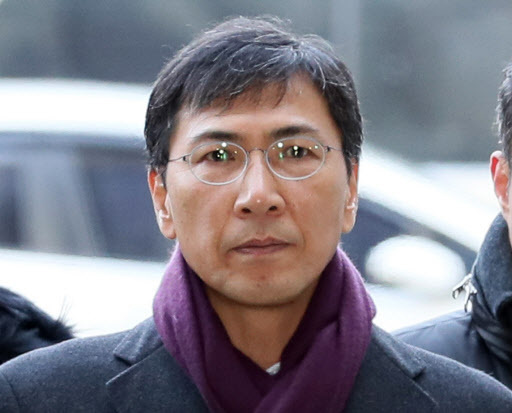The top court on Monday confirmed the 3 1/2-year prison sentence for former South Chungcheong Province Gov. An Hee-jung for raping his female aide, in the country’s highest-profile #MeToo movement case.
 |
(Yonhap) |
The Supreme Court acknowledged “invisible power” held by 54-year-old An -- at one time a strong presidential contender in the liberal bloc -- in using his authority and sexually assaulting the victim -- An’s secretary -- upholding an appeal court’s ruling.
The landmark ruling is hailed as reaffirming the importance of “gender sensitivity” in court proceedings involving victims of sexual crimes. It was also a victory for women’s rights activists who have fought against the culture that compels victims of sexual violence to “act like victims” to prove they have been sexually abused.
Overturning the lowest court’s not-guilty ruling, the Seoul High Court in February ruled that An had abused his former secretary Kim Ji-eun’s vulnerable position as a subordinate to sexually assault her and Kim’s sexual freedom was violated against her will.
An was accused of raping Kim on four occasions and sexually harassing her by abuse of authority on six occasions from July 2017 to February last year. The court acknowledged nine of 10 charges filed against him.
The court sentenced An to 3 1/2 years in jail, ordered him to undergo a sexual violence treatment program for 40 hours and banned him from employment at workplaces related to children and adolescents for the next five years.
In the first ruling on the case, the lowest court found An not guilty, citing that the victim’s testimony was not credible. It acknowledged that An had authority, but said it had not been proven that he had abused it.
An’s defense team had dismissed Kim’s testimony as not credible, claiming Kim had not acted like a victim after sexual intercourse between An and Kim took place.
The Supreme Court, however, underscored the need to “be careful not to lose gender sensitivity” when deliberating cases of sexual crimes, citing the current “assailant-centered” culture.
“Ignoring the credibility of a victim’s testimony without sufficiently considering special circumstances the victim was in cannot be seen as a judgement based on a principle of logic and experiences in line with justice and equity.”
The plaintiff thanked the court for the decision and also thanked her supporters.
“I now want to return to everyday life,” she said in a statement read by an association of women’s rights groups supporting Kim. “I will stand by the voiceless victims of sexual violence around the world from now on.”
The top court’s ruling came 554 days after Kim first came forward as a victim, accusing An of raping her in a television interview at the height of the #MeToo movement that swept the country from politics to education to entertainment fields last year.
The women’s rights campaigners supporting Kim welcomed the verdict.
“We hope that the ruling can put an end to such harassment and sexual violence,” the groups said in a press conference in front of the court building Monday.
An stepped down as governor and halted his political activities after Kim accused him of rape. He apologized to Kim and said he is “morally, politically and socially responsible.” However, he denied legal responsibility, saying the sex was consensual.
(
laeticia.ock@heraldcorp.com)








